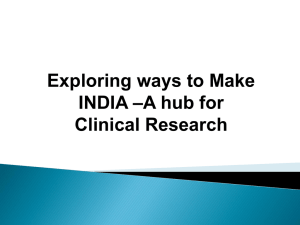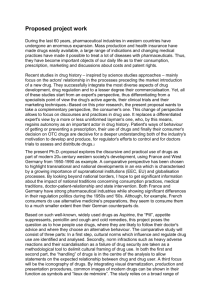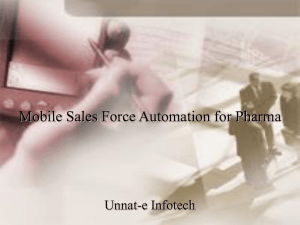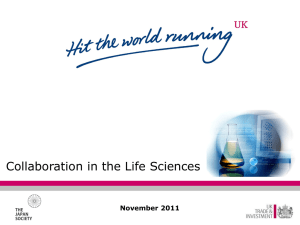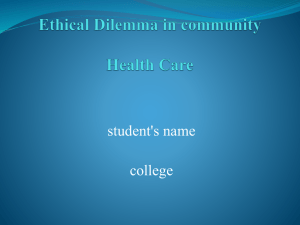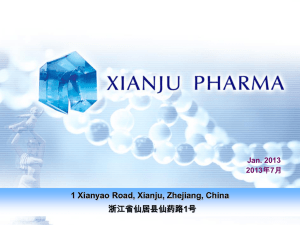File
advertisement
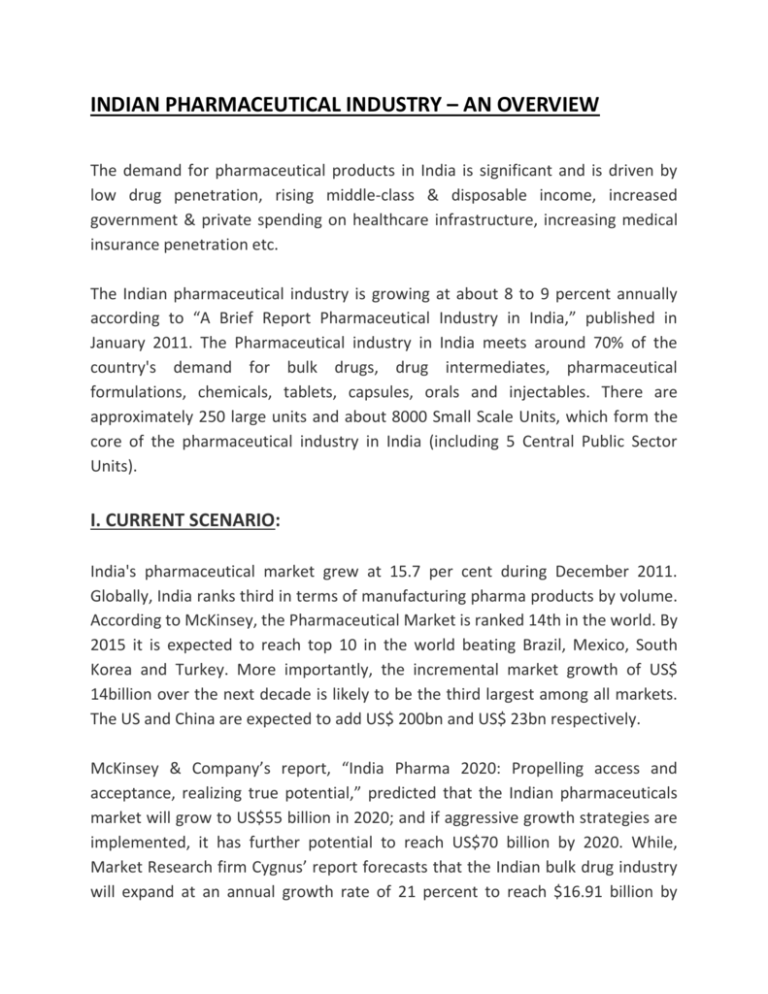
INDIAN PHARMACEUTICAL INDUSTRY – AN OVERVIEW The demand for pharmaceutical products in India is significant and is driven by low drug penetration, rising middle-class & disposable income, increased government & private spending on healthcare infrastructure, increasing medical insurance penetration etc. The Indian pharmaceutical industry is growing at about 8 to 9 percent annually according to “A Brief Report Pharmaceutical Industry in India,” published in January 2011. The Pharmaceutical industry in India meets around 70% of the country's demand for bulk drugs, drug intermediates, pharmaceutical formulations, chemicals, tablets, capsules, orals and injectables. There are approximately 250 large units and about 8000 Small Scale Units, which form the core of the pharmaceutical industry in India (including 5 Central Public Sector Units). I. CURRENT SCENARIO: India's pharmaceutical market grew at 15.7 per cent during December 2011. Globally, India ranks third in terms of manufacturing pharma products by volume. According to McKinsey, the Pharmaceutical Market is ranked 14th in the world. By 2015 it is expected to reach top 10 in the world beating Brazil, Mexico, South Korea and Turkey. More importantly, the incremental market growth of US$ 14billion over the next decade is likely to be the third largest among all markets. The US and China are expected to add US$ 200bn and US$ 23bn respectively. McKinsey & Company’s report, “India Pharma 2020: Propelling access and acceptance, realizing true potential,” predicted that the Indian pharmaceuticals market will grow to US$55 billion in 2020; and if aggressive growth strategies are implemented, it has further potential to reach US$70 billion by 2020. While, Market Research firm Cygnus’ report forecasts that the Indian bulk drug industry will expand at an annual growth rate of 21 percent to reach $16.91 billion by 2014. The report also noted that India ranks third in terms of volume among the top 15 drug manufacturing countries. Further, McKinsey reports Healthcare grew from 4 per cent of average household income in 1995 to 7 per cent in 2005 and is expected to grow to 13 per cent by 2025. DIAGNOSTICS OUTSOURCING / CLINICAL TRIALS According to the estimates, the Indian diagnostics and labs test services, in view of its growth potential, is expected to reach Rs159.89 billion by FY2013. The Indian market for both therapeutic and diagnostic antibodies is expected to grow exponentially in the coming years. Further, more than 60% of the total antibodies market is currently dominated by diagnostic antibodies. Some of the major Indian pharmaceutical firms, including Sun Pharma, Cadilla Healthcare and Piramal Life Sciences, had applied for conducting clinical trials on at least 12 new drugs in 2010, indicating a growing interest in new drug discovery research. GENERICS India tops the world in exporting generic medicines worth US$ 11 billion. The Indian generic drug market is to grow at a CAGR of around 17 per cent between 2010-11 and 2012-13. Over the next few years, it is expected that the patent laws will provide impetus to the launch of patent-protected products. Such products have the potential to capture upto a 10% share of the market by 2015, implying the market size of US $2bn. R&D According to Battelle R&D magazine, gross expenditure on R&D (GERD) by India for 2012 was projected to be US$ 41 billion in purchasing power parity terms, which works out to 0.8 per cent of GDP. This is low both in absolute terms and as a proportion of GDP compared to other countries. This is partly because the size of the R&D base and absorption capacity is not commensurate with requirements. As per estimates in 2010-11, largest R&D expenditures attracted from pharmaceutical sector. R&D intensity for the pharmaceuticals sector was much higher than that for other sectors. Although there have been substantial increases in growth rates of patents filed in India during the last decade, the share of patents filed for work in India through indigenous research is less than 20 per cent of the total. A White Paper on R&D prepared by consultancy firm Deloitte in July 2011 estimates that more than 300 MNCs have set up R&D centres in India. DEMAND The demand for pharmaceutical products in India is significant and is driven by many factors like low drug penetration, rising middle-class & disposable income, increased government & private spending on healthcare infrastructure, increasing medical insurance penetration, changing demographic pattern and rise in chronic lifestyle-related diseases; adoption of product patents, and aggressive market penetration driven by the relatively smaller companies. According to CARE research demand triggers for the growth are: Between 2010 and 2015 patent drugs worth US$171 bn are estimated to go off-patent leading to a huge surge in generic products. High margin pharma export business is expected to grow at a higher rate than domestic market given increased in outsourcing activities. Increased M&A activities is set to consolidate the market which widens geographic reach, strengthens distribution network and venture into new therapeutic segments. Indian companies files the highest number of ANDA’s with USFDA leading to greater chances of approvals and thereby increasing export to regulated markets especially the US. There are currently approximately 175 USFDA and nearly 90 UK-MHRA approved pharma manufacturing plants in India which can supply high quality pharma products globally. Growth from rural markets will outstrip overall pharma market growth, albeit at lower margins, given lower penetration of 18-19% coupled with rising income level and awareness. II. MAJOR PHARMACEUTICAL COMPANIES India based pharmaceutical companies are not only catering to the domestic market and fulfilling the country’s demands, they are also exporting to around 220 countries. They are exporting high quality, low cost drugs to countries such as the US, Kenya, Malaysia, Nigeria, Russia, Singapore, South Africa, Ukraine, Vietnam, and more. Currently, the US is the biggest customer and accounts for 22 percent of the sector’s exports, while Africa accounts for 16 percent and the Commonwealth of Independent States (CIS) places around eight percent of orders, as per Research and Market report. For most of the pharma companies, domestic business contributes in the range of 20-50% of the overall revenue. US business contribution stands at 20-30% and remaining comes from the RoW markets. Leading Indian Players by Sales Company Cipla Ranbaxy Lab Dr Reddy's Labs Sun Pharma LupinLtd Aurobindo Pharma Piramal Health Cadila Health Matrix Labs Wockhardt Sales in US $Mn 6,368.06 5,687.33 5,285.80 1,985.78 4,527.12 4,229.99 1,619.74 2,213.70 1,894.30 651.72 Year End March 2011 December 2010 March 2011 March 2011 March 2011 March 2011 March 2011 March 2011 March 2010 December 2011 MAJOR RECENT M&AS: Sun-Merck JV: Sun and Merck have formed JV to develop, manufacture and commercialize new combinations and formulations of innovative, branded generics in the Emerging Markets. Under the JV, Sitagliptin and Sitagliptin+Metformin have already been commercialized in the Indian markets. Lupin-Lilly JV: They entered into collaboration to promote and distribute Lilly’s Huminsulin range of products in India and Nepal. Cadlia_Bayer JV: The venture will sell brands from both companies in Indian markets. Biocon-Pfizer JV: This collaboration will give Pfizer exclusive rights to commercialize Biocon products globally including co-exclusive rights with Biocon in Gernmany, India and Malaysia. Universal Medicines – Aventis: Aventis has acquired Universal Medicines for over US$ 100mn. TRENDS: All companies, including MNCs, have increased their field force in the last one year. Indian companies are entering into strategic tie-ups with MNCs to strengthen their product portfolio. Companies are expanding their presence in rural markets. Acquisitions by MNCs to gain quick foothold in the fastest growing Indian pharma market. Most of the Pharma companies have shown considerable decline in growth in the first half of 2011. The slowdown is widely visible in the Chronic and Acute categories. Anti-invective, pain and gastro together contribute 1/3rd of the total pharma market. The pharma companies have started facing challenges in domestic market due to increase in competition from unlisted MNCs in this segment. They are rapidly expanding their field force to extend their geographical reach. Companies like Cipla, Torrent and IPCA which are mainly focused on Indian market are already feeling the heat. Growth rates of companies such as Cadila, Dr. Reddy and Ranbaxy have already come down. On the other hand Lupin and Sun are showing growth due to the shift of focus towards specialty therapies, where competition is relatively low. Basing on the changing macro factors and economic growth Emkay Research has expected the growth estimates of the pharma companies to decrease. It cut down the domestic growth estimates for Cadila, Cipla, Dr. Reddy, IPCA, Torrent and Unichem for FY12 and FY 13 by 2% to 5% and retained the growth estimates for Lupin, Ranbaxy, Sun, GSK and Pfitzer. INDIAN PHARMA – DOMESTIC GROWTH EXPECTATIONS Company Cadila FY12 Domestic Growth 12% Earlier growth estimates 15% Cipla 10% 15% Dr. Reddy’s Glenmark 10% 16% 15% 16% IPCA Lupin 10% 19% 17% 19% Ranbaxy Sun Pharma 12% 15% 12% 18% Torrent Unichem 12% 5% 12% 9% GSK 13% 13% Pfizer 14% 14% Source: Emkay Research III. GOVERNMENT INITIATIVES: Government initiatives in the public health sector have recorded some noteworthy successes over time with focus on investments related to better medical infrastructure, rural health facilities etc. 100 per cent FDI is permitted for health and medical services under the automatic route. The National Rural Health Mission (NHRM) had allocated US$ 10.15 billion for the upgradation and capacity enhancement of healthcare facilities. Moreover, in order to meet revised cost of construction, in March 2010 the Government allocated an additional US$ 1.23 billion for six upcoming AIIMS-like institutes and upgradation of 13 existing Government Medical Colleges. As a result, FDI inflow in hospital and diagnostic centres was US$ 1.1 billion during April 2000 and November 2011, according to st Department of Industrial Policy & Promotion (DIPP) data. FDI inflow in medical and surgical appliances stood at US$ 472.6 million during the same period. And the drugs and pharmaceuticals sector has attracted FDI worth US$ 5.0 billion between April 2000 and November 2011 GENERAL PROFILE OF THE COMPANY Name : M/S STERIL GENE LIFE SCIENCES (P) LTD. Type of Organization : Joint venture Nature of Business : Pharmaceutical company, manufacturing a range of pharmaceutical preparations like Tablets, Hard Gelatin Capsules, Soft Gelatin Capsules, Dry Syrup, Dry Powder Injections, Suspension and Liquid Injections with LYOPHILIZATION Location of Office : No. 45, Main Road, Mangalam Village, Villanur Commune, Puducherry – 605 110. Location of Works : No. 45, Main Road, Mangalam Village, Villanur Commune, Puducherry – 605 110. Product Name : Tablets, Hard Gelatin Capsules, Soft Gelatin Capsules, Dry Syrup, Dry Powder Injections, Suspension and Liquid Injections with Lyophilization. Chairman : Mrs. Zenaida Dizon Balajadia Managing Director : Mr. A. M. Sulaiman Land & buildings : Owned 20 Acre (872100 ft2) Name of the Certifying Surgeon : Dr. S. Bhuvaneswari Medical Inspector of Factories Staff & Workers : Cepha - 29 Engineering - 39 General - 04 General OSD - 14 Telephone Number : Hormone - 24 HR & Admin - 12 QA - 18 QC - 30 R&D - 09 Regulatory - 08 Stores - 08 LI – Engineering - 07 LI – Production - 25 LI – Stores - 01 Accounts - 05 Total Staff = 233 91-413-2905785 / 86 91-413-2661102 Bankers : Indian Overseas Bank (IOB) Insurance Company : Bhajaj Insurance PROFILE OF THE COMPANY Steril-Gene Life Sciences (P) Ltd is a pharmaceutical company, manufacturing a range of pharmaceutical preparations like TABLETS, HARDGELATIN CAPSULES, SOFTGELATIN CAPSULES, DRY SYRUP, DRY POWDER INJECTIONS, SUSPENSION and LIQUID INJECTIONS with LYOPHILIZATION. The 20 acre factory, located at Pondicherry (India), consists of 4 major state-of-the-art manufacturing facilities HORMONE CEPHALOSPORIN LIQUID INJECTION (GENERAL CATEGORY) ORAL SOLID DOSAGE (GENERAL CATEGORY) BLOCKS The facility is WHO - GMP certified and is adequately supported by its own QA/QC laboratory, Engineering, Utilities and Effluent treatment plant. Steril-Gene provides contract manufacturing and outsourcing solutions to the pharmaceutical business. Forging partnerships and creating new business potential, we strive to ensure our products always meet the expectations of our clients. We already export finished products to Europe, Africa, Asia, CIS, and Central and Latin American Countries. These products are manufactured in MHRA and TGA approved plants that are a part of our extended facilities. Vision At Steril-Gene, our vision is to support our marketing partners with the latest innovations in drug delivery systems and to become a global leader as manufacturer of health care products by providing solutions and alternatives. Mission Provide added value to our Partners through latest technology. Establish a strong presence in the Healthcare Market. Build a diverse, productive and challenging work place. Build a long term relationship with our customers, suppliers and shareholders by maintaining highest professional standards. Group Companies The Madras Pharmaceuticals – www.madraspharma.com Lloyd Laboratories, Inc – www.lloydlab.com Softget Healthcare Private Ltd – www.softgethealthcare.com ABOUT COMPANY Steril-Gene provides contract manufacturing and outsourcing solutions to the pharmaceutical business. Forging partnerships and creating new business potential, we strive to ensure our products always meet the expectations of our clients. We already export finished products to Europe, Africa, Asia, CIS and Central and Latin American Countries. These Products are manufactured in MHRA and TGA approved plants that are a part of our extended facilities. ABOUT CAREER We at Steril-Gene have a mission to create a dynamic work environment. The management team culture is result oriented, performance & value driven. Steril-Gene provides opportunities where people can grow personally and professionally in an energetic and customer focused environment. At Steril-Gene work is a pleasure. We want you to have job satisfaction and recognize merits & talents. SOCIAL RESPONSIBILITY Well designed ETP to take care of plant effluent with Zero discharge. Environment Monitoring programme for all manufacturing sections. PPE (Personnel Protective Equipment) for individuals coming in contact with API. HVAC designed to meet regulatory & cGMP Requirements. Well designed Change room for Core Manufacturing Area. BLOCKS IN STERIL-GENE Block A – CEPHA Block B – HORMONE Block C – LIQUID INJECTION Block D – QA & QC Block E – UTILITY, WATER PLANT Block F – EDP Block G – Time Office & Security HORMONE Hormone Block, it is dedicated for manufacturing of hormonal products and will not form part of any other non-hormone product. The company is manufacturing both female and male hormonal products, which are mainly contraceptives and pregnancy sustaining hormones. They are manufactures in the following dosage forms. Tablets Softgel Capsules CEPHALOSPORIN This is dedicated sterile antibiotic range of products, especially cephalosporin, which is among the several range of antibiotic. With U.S. F.D.A. – compliant plant, the company is producing several products which are active predominantly against both Gram-positive bacteria & Gram-negative bacteria. They are manufactured in the following dosage form: Sterile Dry Powder Injection Dry Suspension Tablets Capsules Ready Mix Suspension LIQUID INJECTABLE – GENERAL CATEGORY, SMALL VOLUME PARENTERALS It is dedicated block for manufacturing liquid injectables for conditions like fever, malaria, stomach ulcers, and infections. These are prepared in the following forms: Ampoules Vials Lyophilization General Oral Solid Block We manufacture a broad range of tablets which can be used to treat conditions like fever, body pain, stomach ulcers, antibiotics, infections etc. these are prepared in the following forms: Tablets Capsules PRODUCT PROFILE HORMONE Tablets Soft gel Capsules CEPHALOSPORIN Sterile Dry Powder Injection Dry Suspension Tablets Capsules Ready Mix Suspension LIQUID INJECTABLE – GENERAL CATEGORY, SMALL VOLUME PARENTERALS Ampoules Vials Lyophilzation GENERAL ORAL SOLID BLOCK Tablets Capsules FACILITY BRIEF The Facility is spread over an area of 20 Acres and has 4 Manufacturing Blocks. Hormone Block for Softgelatin Capsules and Tablets. Cephalosporin Block comprises of a dedicated section for Dry Powder Injectable, Dry Syrup, Suspension, Tablets, Capsules & Drops. Liquid Injectable Block for Liquid Injectable in Ampoule and Vial with Lypholization. Oral Solid Dosage Block for manufacture of Tablets and Capsules in General category. Well equipped Warehouse for RM, PPM, SPM & FG with controlled Temperature & Humidity. Separate Utility Block to take care of all formulation unit and proposed future expansion. Dedicated QA/QC to handle Incoming, In-process and finished goods with independent Microbiology section. Well designed HVAC for different formulation facilities as per c-GMP guidelines. In-house R & D Setup for Product Development. Independent Water system which provides USP grade Purified Water & Water For Injection. MAJOR MACHINERY Liquid Injectable Combi Line from ROTA, Germany. Capsule filling Machines from SEJONG, Korea. Dry Syrup filling from DOSA, Italy Water System from ‘Christ- Nishotech’ All Process Equipment and Packing machineries from Reputed Indian & European Manufacturers. QA/QC U.S. & E.U. Compliant Laboratory. Separate Facility for Sterility and Micro analysis. World class Instruments to handle In-coming, In-process and Finished Goods. Qualification Documents for all key equipment. Validation as per defined Protocol. Environment Monitoring programme for all manufacturing sections. CAPACITIES SL.NO MANUFACTURING FORMULATION UNITS IN MILLION SECTION PER PER SHIFT(8HR) ANNUM(300 Days) 1 Hormone Softgel Capsule Tablet 0.77 1.10 231.00 330.00 2 Cephalosporin Tablet 2.20 660.90 Capsule 1.84 552.00 Dry Syrup 0.02 006.00 D.P. Injectable 0.05 015.00 Ampoule 0.096 14.40 Vial 0.096 14.40 Vial 0.072 21.60 Tablets 2.15 650.00 Capsules 0.80 240.00 3 4 Liquid Injectable Oral Solid Dosage RECRUITMENT PROCESS Profile Sourcing Telephone Interview Face to Face Interview Written Preliminary Interview Technical Round Selection Training period (1yr) Appointment PROFILE SOURCING MAIL AD Profile Sourcing WEBSITE (Naukri) GATE TELEPHONE INTERVIEW The telephone interview is a quantitative method. Compared to other quantitative methods, the strength of the telephone interview is, that no matter where the respondents are situated geographically, it is easy to complete interviews. Compared to the personal interview, the telephone interview is an inexpensive way to conduct a survey. The telephone interview method can furthermore secure a high level of representativity, as almost all Danes have a telephone. FACE TO FACE INTERVIEW Face-to-face interview is a data collection method when the interviewer directly communicates with the respondent in accordance with the prepared questionnaire. This method enables to acquire factual information, consumer evaluations, attitudes, preferences and other information coming out during the conversation with the respondent. Thus, face-to-face interview method ensures the quality of the obtained data and increases the response rate. Face-to-face standardized / semi-standardized interview is a quantitative research tool. Therefore, it is applied in national or certain region population inquiries, consumer, and customer or reader surveys. Furthermore, this method is practiced when performing Omnibus and Ad Hoc researches. REGISTER MAINTAINED BY SECURITY LL Inward Register RM & PM Inward Register Engineering Inward Register Sales – Outward Register Courier – In Register Returnable Register Non-Returnable Register Job work Register – Inward Job work Register – Outward SWOT ANALYSIS OF STERIL-GENE LIFE SCIENCES PVT. LTD. STRENGTH Steril-Gene has high fixed assets, and it can be used to acquire more customers. The customers like Cipla, Lupin and so on are giving more orders to Steril-Gene. There is huge requirement of outsourcing in the pharmaceuticals industry. WEAKNESS The company has just initialized few years ago, and it has to penetrate the current market players. The company has less utilization of its facilities. The Company is facing loss, but improving slowing. The Company has fewer current assets, which leads the company to shortage of funds. OPPORTUNITY The industry requires lot of outsourcing, Steril-Gene provides good source of outsourcing. The Company has new facility, it can develop its own products. The Company can grow fast by utilizing its fixed assets. The Company can market its own products, and create its own product portfolio. THREATS The Company has to face lot of competition. Currently the company has to put in more efforts to retain its customers. The cost per unit may be higher than the competitor. Can lead to loss if the facilities are not utilized properly.
